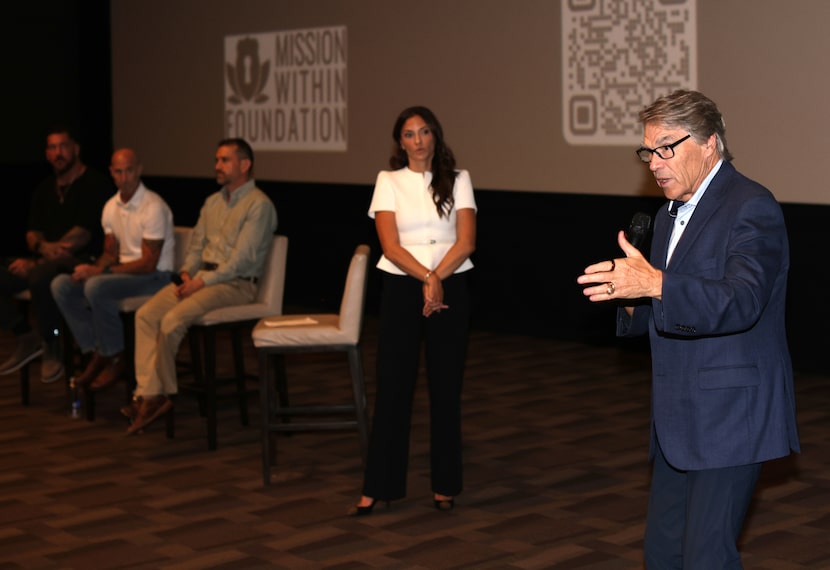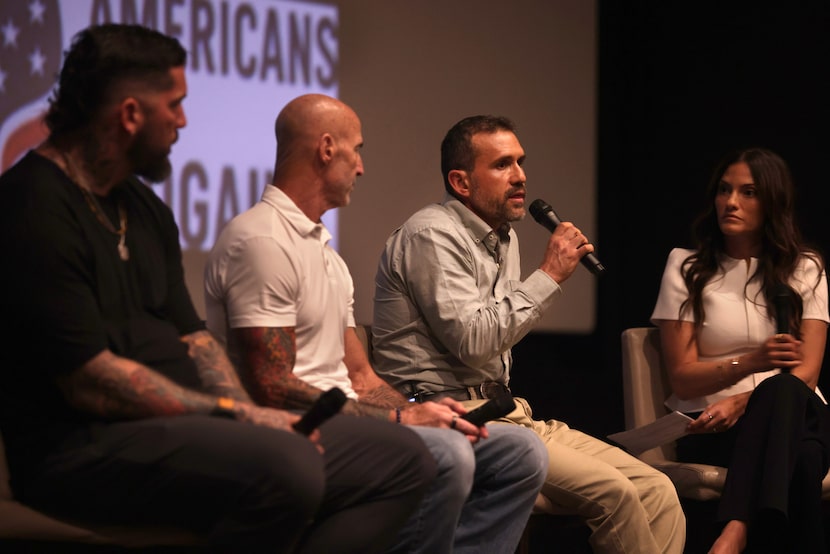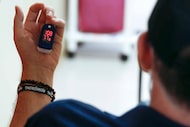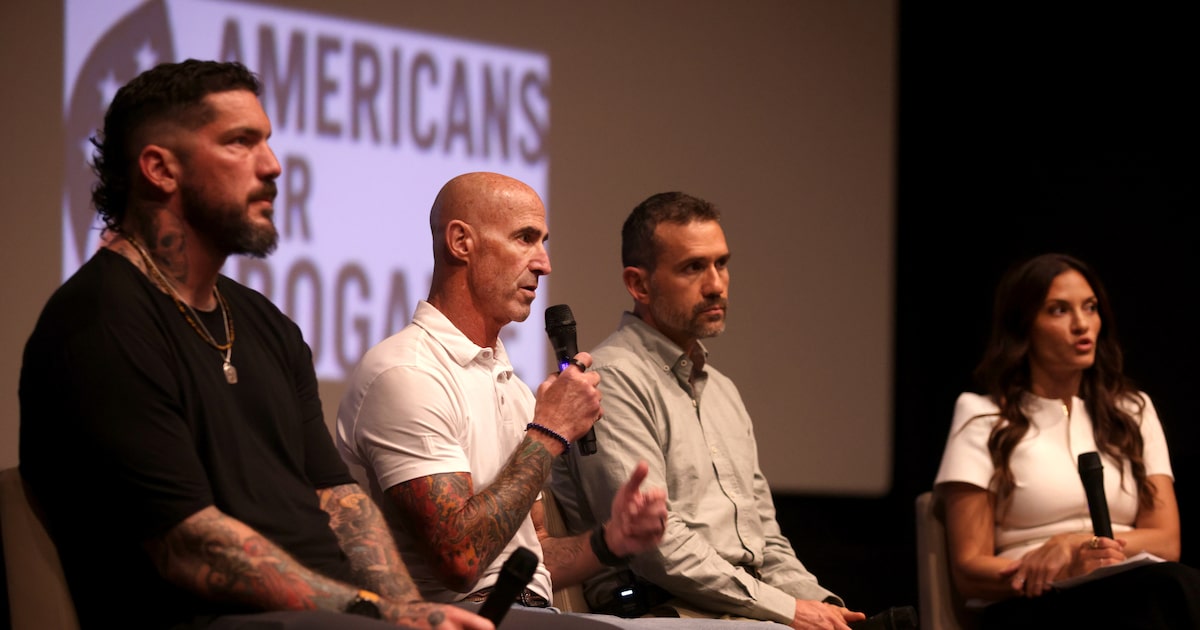Former Gov. Rick Perry was in Dallas on Thursday night, but it wasn’t to talk politics.
After a screening of clips from an unreleased documentary about the psychedelic ibogaine at Cinépolis Dallas, Perry argued that Texas was poised to open access to the drug to those who could benefit from it. Perry himself took ibogaine in 2023 to treat anxiety and other mental health issues likely stemming from his military service, he told The New York Times. Since then, the former presidential candidate has dedicated his career to promoting ibogaine as a potential cure for traumatic brain injury, substance abuse and cognitive decline. “What we’re doing is changing the world,” said Perry, “and we’re saving lives.”

Rick Perry (right) speaks during a panel discussion at Cinépolis Luxury Cinemas in Dallas on Oct. 16, 2025.
Jason Janik / Special Contributor
He was referring, in part, to the legislative push that led Gov. Greg Abbott to sign Senate Bill 2308 in June. The measure authorizes up to $50 million in matching funds for in-state clinical trials run by medical schools, research consortia, drug companies or others, with the aim of producing data that could support an eventual approval for ibogaine use by the Food and Drug Administration. Ibogaine is currently classified as a Schedule I hallucinogenic under the Controlled Substances Act, illegal to prescribe and deemed to have no accepted medical use.
Tracing ibogaine’s history
But the drug has long been used for medicinal and ritual purposes in Gabon, Cameroon and other countries of Western and Central Africa, according to the clips shown from British filmmaker Lucy Walker’s unreleased documentary Thursday at the Dallas Cinépolis. Walker, who’s also behind Netflix’s How to Change Your Mind, a series about the history and applications of psychedelics, traces the use of ibogaine from its African roots to studies in the United States for addiction, traumatic brain injury and mental health conditions in her current project. She also explores the role of husband-and-wife advocates Howard and Norma Lotsof, who launched a decades-long campaign to get scientists and regulators to study the medical potential of ibogaine.
The film spotlights recovery stories as military veterans and others flock to Mexico, where ibogaine treatment is legal but unregulated.
A panel discussion after the screening featured former NFL lineman Robert Gallery, former Marine Jay Kopelman and Dr. Martín Polanco, a central figure in Walker’s film. According to his website, Polanco treats addiction, depression, traumatic brain injury and post-traumatic stress disorder (also known as PTSD) with ibogaine and another psychedelic called 5-MeO-DMT in Mexico. Polanco also founded The Mission Within, a psychedelic-assisted treatment retreat for military veterans and their families near Tijuana.
Breaking News

Dr. Martin Polanco (third from left) speaks during a panel discussion spotlighting veterans’ mental health crisis and the potential of ibogaine at Cinépolis Luxury Cinemas in Dallas on Oct. 16, 2025.
Jason Janik / Special Contributor
Neuroimaging studies suggest ibogaine can spur nerve growth and boost neuroplasticity, the brain’s ability to rewire itself by forming new connections. Polanco said the drug’s psychedelic effects and their duration depend on follow-up care such as lifestyle changes and meditation. But he emphasized that larger, more rigorous trials are needed to determine benefits and risks and to pave a path toward federally approved treatment.
“We still need to collect a lot of data,” Polanco said. “The studies that have been done have been pretty small. … We hope that bigger clinical trials take place. From what we have seen so far, ibogaine works best for addiction, and within addiction, it works best for alcohol and opioids.”
Further studies needed
Polanco said there’s anecdotal evidence that ibogaine may help early Parkinson’s, multiple sclerosis and other neurodegenerative diseases, though the underlying biological mechanisms remain unclear. In 2025, Mexico-based Ambio Life Sciences started a clinical ibogaine program to test the drug in people with neurodegenerative conditions.
Ibogaine has not undergone significant double-blind, placebo-controlled trials — participants nor researchers know who receives the drug. Most studies to date are open-label, where both participants and researchers know what the treatment is, or based on anecdotal reports.
Safety remains a concern: Ibogaine has been linked to sudden death from serious cardiac events. According to a 2021 editorial in the journal Expert Opinion on Drug Metabolism and Toxicology, there have been 33 ibogaine-related deaths from 1990 to 2020, mostly occurring in “unsafe settings without proper medical monitoring.”
Miriam Fauzia is a science reporting fellow at The Dallas Morning News. Her fellowship is supported by the University of Texas at Dallas. The News makes all editorial decisions.
 UT Arlington researcher developing electric Band-Aid to mend damaged hearts
UT Arlington researcher developing electric Band-Aid to mend damaged hearts
Backed by NIH funding, Yi Hong is testing an electrically active, regenerative patch that aims to help with recovery from heart attacks.
The cure for veterans’ mental health could be psychedelics, new documentary explores
Cinépolis Dallas hosts a sneak peek on ibogaine’s potential for mental health issues in veterans.
 Prescription drug coverage options are shrinking for Medicare shoppers. Here’s how
Prescription drug coverage options are shrinking for Medicare shoppers. Here’s how
The number of available, stand-alone drug plans has fallen for a few years, and that trend will continue for 2026.
 Nobel Prize 2025: Dallas-area scientists expanding on research that won chemistry award
Nobel Prize 2025: Dallas-area scientists expanding on research that won chemistry award
Scientists at the University of Texas at Dallas are using metal-organic frameworks for cleaning air and water and delivering vaccines.
